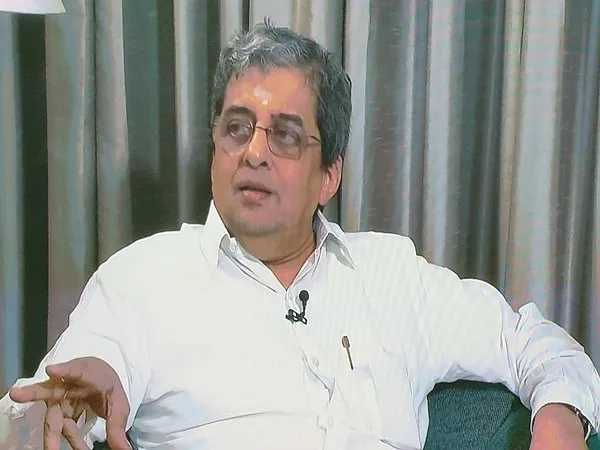China has invested in white elephant projects in Sri Lanka that primarily produce jobs for Chinese people while benefiting no Sri Lankan, said Chennai-based policy expert N. Sathiya Moorthy.
While speaking with ANI, policy commentator Sathiya Moorthy said, “The problem with Chinese debt is about investment in white elephant projects like expressways that did not have use and did not produce revenue to repay the loan. It generated jobs for Chinese in China and Sri Lanka, but no Sri Lankan benefited in terms of jobs and family incomes.”
Sathiya Moorthy busted the common myth of China lending a huge amount of money to Sri Lanka. He noted, “It is not debt-diplomacy as commonly understood. China accounts for only 10 per cent of Sri Lanka’s external debt and there are bigger lenders in international institutions.”
Commenting on the acting president Ranil Wickremesinghe’s possible standpoint (if he remains to hold the position) over Chinese white elephant projects, the policy analyst pointed out that China will work with the leader that the Sri Lankans ‘elect’. It is not about whether it is Rajapaksa or not and, in fact, it is about the nature of the relationship, he added.
For instance, the analyst said, “Though the Rajapaksas called in China for the Hambantota project, the successor Maithripala Sirisena and Ranil Wickremesinghe government (2015-19) alone transferred the property/territory to the Chinese builders.”
Notably, Maithripala Sirisena from Sri Lanka Freedom Party served as the seventh President of Sri Lanka from 9 January 2015 to 18 November 2019 while Ranil Wickremesinghe of the United National Party has been sworn in as prime minister for the most times in the country’s history, on six occasions (May 1993, December 2001, January 2015, August 2015, December 2018, and May 2022)
“After blaming the Rajapaksas for pushing the nation into a Chinese ‘debt-trap’, this (Ranil Wickremesinghe’s) government also borrowed big time from China, again for the very same white elephant projects, namely, more expressways,” he continued saying.
As the stage is all set for Sri Lanka’s presidential elections, commenting on the current political situation, he said, “There is no clarity in SLPP’s position and unity. If no candidate obtains a simple majority of 113 votes in a Parliament with 225 MPs, the second preference vote would be taken into consideration.”
Sri Lanka has been witnessing an uprising as the protestors first demanded the ouster of Rajapaksas and are now calling for the acting President Wickremesinghe to step down from his position.
Observing unrest in Sri Lanka amid the economic and political fiasco, the policy analyst said, “The burning down of ruling party politicians’ homes on 9 May, followed by that of PM Ranil’s house on 9 July, all point to a certain possibility. Some of the parties spearheading the mass protest have since talked about ‘civil war’ if Ranil is elected President, among other reasons.”
Furthermore, he said that no refugee crisis is expected in India if the situation in northern areas remain normal.
He said that Sri Lankans appreciate India’s generosity in their hour of national crisis. “India-Sri Lanka relations are always on an even keel. Whenever Sri Lanka moves towards China now and the US during the Cold War, there have been episodic setbacks, or perceptions of the same. Overall, the Government of India has had a handle on Sri Lanka relations all along, and the current acknowledgement that India is the only nation to rush aid and credit continually, as if on demand, has only bolstered the average Sri Lankan people’s appreciation of the Indian largesse in their hour of national crisis.”
“Yet, ideological anti-India forces would continue to place hurdles, but both governments, now or later, are not incapable of navigating the same through a safe course, for the collective betterment of their peoples.”
Over the possibility of Sri Lanka to be ruled by a civil society activist, the analyst said, “No. The nation needs an efficient and experienced leadership or leaderships through the next 10 years at least to guide politics and restore the economy. Activists come with their limitations.”
One of the demands that Sri Lankans have been making is the roll-back of the 20th amendment. The 20th amendment brought back most of the constitutional powers to the President which were previously abolished in the 19th amendment.
“Through the crisis, there were talks on roll-back from the 20th Amendment to the 19th, especially in relation to curtailing the sweeping powers of the Executive President, and restoring the forgotten supremacy of Parliament through a Cabinet led by the Prime Minister.”
The 19th Amendment (19A) to the Constitution of Sri Lanka was passed and it envisaged the dilution of powers of Executive Presidency, which had been in force since 1978. However, 20th amendment brought back most of the constitutional powers to the President which was previously abolished in the 19th amendment.
Responding to a question on whether Sri Lanka will see the roll-back of the 20th amendment the analyst said, “According to Sri Lankan media reports, Ranil, as the candidate, has promised the same, or restoring 19-A through a new constitutional amendment Bill, to some Opposition group leaders after the polling date was announced.”
“In terms of details, there could be quibbling, both inside Parliament and outside, before the Bill takes shape. If the Rajapaksas still hold sway, their line of thinking would have to be accommodated, but indications are that they would not stand in the way, after they have understood the people’s mood.”

